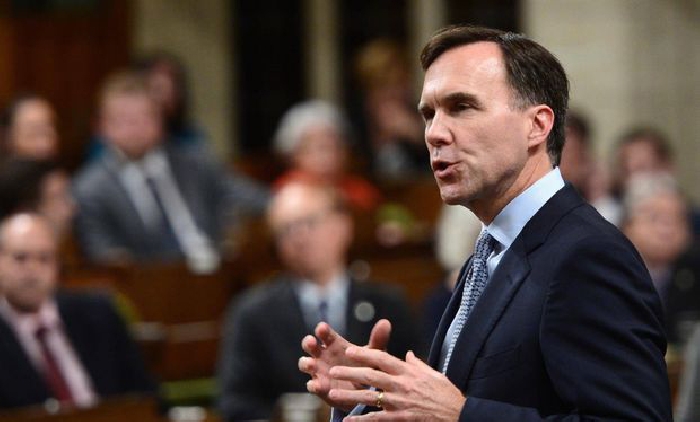Business groups critical of budget
February 28, 2018, 11:14 am


Business groups were critical of Federal Finance Minister Bill Morneau's budget delivered in the House of Commons Tuesday
The Canadian Taxpayers Federation (CTF) expressed concern about the budget, which the CTF said did not lay out a clear path to eliminate the deficit and failed to address growing concerns about Canada’s tax competitiveness.
“The good news is this budget largely holds the line on spending,” said CTF Federal Director Aaron Wudrick. “The bad news is the government has once again failed to tackle the structural deficits it created in the 2016 budget and which will add $80 billion in new federal debt by 2022.”
The federal debt is projected to rise to $730 billion by 2022 with debt interest costs alone expected to jump from $26 billion per year in 2018 to $33 billion per year by 2022.
The government’s proposed treatment of small business passive investment abandoned the proposed hard limit of $50,000 on annual passive investment income in favour of a gradual phase out of the deduction limit for annual passive investment income between $50,000 and $150,000.
“The new passive investment rules, combined with the new income sprinkling rules, will still squeeze businesses for more than $1 billion a year by 2020,” said Wudrick. “But it’s fair to say these further revisions are a big improvement over the government’s original proposals.”
Wudrick also noted that the federal budget does not include any measures to respond to the major business tax cuts in the United States which are expected to impact Canada’s ability to attract and retain jobs and investment.
“This budget is chock full of sunny-sounding social policy, but if the Americans end up eating our lunch on the tax front, we won’t have the revenue to pay for any of it,” noted Wudrick.
Wudrick also panned the budget’s panoply of subsidies and handouts offered under the guise of “innovation and skills.”
"We believe that Canada's future success rests on making sure that every Canadian has an opportunity to work, and to earn a good living from that work," he said in a speech prepared for delivery in the House of Commons. "And that includes Canada's talented, ambitious and hard-working women."
The budget is designed to attract women to jobs traditionally dominated by men, such as high-quality, well-paid jobs in the skilled trades.
The Canadian Federation of Independent Business (CFIB) said that the 2018 federal budget may be somewhat less harmful than originally expected, but will not improve the overall health or competitiveness of the nation’s entrepreneurs.
“While we compliment the government for rethinking its plans for taxing passive investments, it remains to be seen how significant this improvement will be,” said CFIB President Dan Kelly. “The new rules appear to be simpler and may improve things for some business owners from the earlier proposals, but others will lose the benefit of the lower small business rate due to past investments.” The new plan ends the benefit of “grandfathering” past investments from the earlier proposal.
“The tax changes for small business remain a billion-dollar take-away from entrepreneurs at a time when entrepreneurs in the US are seeing their tax bills drop considerably,” Kelly added. “With uncertainty over NAFTA, Canada needs to focus on improving our tax competitiveness – instead we’re making it worse.”
“It is important to keep in mind that Canada’s SMEs are facing massive new cost pressures in the coming years, including five years of CPP/QPP hikes, five years of carbon tax/pricing increases, and higher minimum wages in several provinces,” Kelly said. “On top of that, entrepreneurs know that today’s deficits are tomorrow’s taxes. The lack of a plan to get Canada out of deficit spending is deeply troubling,” added Kelly.
“CFIB is pleased to see a focus on ways to support female entrepreneurs and we look forward to working with Small Business Minister Bardish Chagger on these initiatives going forward,” Kelly said.
“We welcome new measures to address the burden of red tape and regulation in Canada, particularly the focus on improving services at the Canada Revenue Agency,” said Kelly. “Fixes to the CRA call centre can’t come soon enough.”
Indigenous communities will see a $4.1-billion investment over five years, in addition to dollars already earmarked in the 2016 budget. That money will be used to tackle long-standing problems with infrastructure and social services through investments in new housing and improved child welfare and health programs.
There's also a pledge for a new national pharmacare program — but the budget says nothing about what that might cost. Eric Hoskins, who resigned as Ontario's health minister Monday, was officially named today as the chair of a new council that will hold nationwide consultations on how to proceed with a national program.
The budget also unveils details of a proposed new five-week "use-it-or-lose-it" parental leave benefit, pegged at a cost of $1.2 billion over five years starting this year, and another $345 million each year after.
Styled after a popular Quebec provincial program, it will give fathers or non-birth parents, including adoptive and same-sex partners, five weeks of leave.
The incentive is to become available in June 2019 — just months before the next federal election.
Promised legislation on pay equity for federal and federally regulated employees isn't costed in the budget, but the document says it will be included in budget implementation legislation. It estimates the move could reduce the gender wage gap by about 2.7 cents on the dollar for the core public administration.
Former Saskatchewan finance minister Janice MacKinnon agrees with the concept of growing Canada's productivity by encouraging more women to join the workplace, but said the measures included in the budget are "small and symbolic."
She said the budget's measures won't be enough to have any influence on whether women work or stay home.
"The sorts of things that are going to change that decision are what happened in Quebec — billions of dollars spent to make daycare affordable and available," she said.
MacKinnon said women make decisions about entering the workforce on the basis of different criteria than men; they're more likely to look at work-life balance than salary, for example.
The budget commits $231.4 million over five years to fight the opioid crisis that has claimed thousands of lives — including a $150-million emergency fund for provinces to launch treatment programs. The budget also has set aside money for First Nations communities to address substance abuse, including opioids.
The budget offers new money to improve the administration of justice through expanded unified family courts, and $17.1 million over five years for six new judicial positions for Ontario and one in Saskatchewan.
The budget forecasts an $18.1-billion deficit in the 2018-2019 fiscal year, which gradually will decline to $12.3 billion by 2022-2023.
During the 2015 election campaign the Liberals promised to eliminate the deficit by 2019. Today, Morneau defended the decision to run successive deficits as a strategy to realize long-term economic gains and leave lasting positive impacts for women and Indigenous people, and on innovation and the fight against climate change.
The budget is being tabled in a climate of deep global economic uncertainty, with North American Free Trade Agreement (NAFTA) negotiations still underway and the U.S. ushering in an aggressive tax reduction plan.
Conservative Leader Andrew Scheer said the budget is the work of an "irresponsible government" and criticized the spending plan for not including measures in case NAFTA "hits the rocks."
"Not only have they failed to manage this budget in terms of deficit priorities, but there are actually things in here that they should have contingency for, and they're not," he said.
NDP Leader Jagmeet Singh praised the policies to implement pay equity and encourage more women to enter the workforce, but raised concerns that no dollars were attached to the measures, or for pharmacare.
A national program is "critically important" as Canadians are skipping dosages or cutting pills in half because they can't afford medication, Singh said, yet without a budget line for pharmacare the Liberals are not showing they truly are committed to it.
"We need a government to have courage, to take actions needed to address income inequality and lift people up with programs like pharmacare," he said.
Former Conservative industry minister James Moore called the budget a missed opportunity to signal to the business community that the government will step in to keep Canada competitive and to soften the economic blow if NAFTA talks fail.
Canada is becoming less attractive for investors, he said.
"This budget doesn't recognize the reality of the Trump presidency and the shift that has happened in fiscal and trade policy. Canada has to be prepared for it and this budget doesn't prepare Canada for that new reality," he said.
In his budget speech, Morneau said Liberal policies are reaping strong results for Canada's economy, with 600,000 new jobs created in the past two years and unemployment rates at the lowest level in more than 40 years.



































